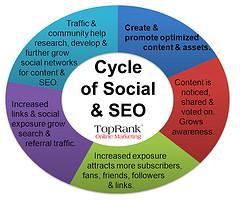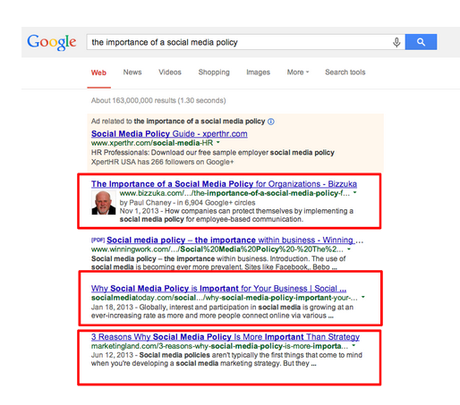 Social media, paired with great content and smart SEO is an important part of being successful online. And by “successful” I mean appearing high in search results, driving targeted traffic to your website, and doing things like driving leads and sales. All with a goal of, you know, selling more stuff to more people. Which is pretty much what we all want, isn’t it? Okay, now that we agree on that, let’s move on.
Social media, paired with great content and smart SEO is an important part of being successful online. And by “successful” I mean appearing high in search results, driving targeted traffic to your website, and doing things like driving leads and sales. All with a goal of, you know, selling more stuff to more people. Which is pretty much what we all want, isn’t it? Okay, now that we agree on that, let’s move on.
In the past, link building has been one of the ways SEO professionals endeavored to send signals to Google that your website was credible, which then impacted how favorably your site appeared in search. The shortest possible explanation is that SEOs worked their magic to get other websites to link to your site – sometimes good magic, sometimes not so good magic. But, as these things go, people gamed the heck out of that and Google responded by changing its algorithm and most things about link building changed. Overnight.
Content + Smart SEO + Social Media
That’s the formula. Content + Smart SEO + Social Media is what it takes today to leverage the web for business purposes. And what never ceases to amaze me is how often we find these things siloed within an organization – no matter the size. I had lunch yesterday with someone who has one team doing his SEO work, one team doing his content development for a corporate blog and one team doing social media community management. And they are not connected – in any way. I didn’t scream (out loud, anyway), but I wanted to. But that’s not really all that unusual. And it actually tells me a lot about those three vendors. If it hasn’t occurred to them that the best results will be produced when all those things are connected – social, SEO and content — well, this individual is working with the wrong people. And with people who don’t have the best interests of him and his company in mind.
Why Social Signals Matter
Social signals are important, and they’re becoming increasingly more so. We base our purchasing decisions on what we find online about a product or service we want to buy or a brand we want to buy from, and we ask our friends what they think about that brand, product or service. Equally as important, social signals show Google how the boatloads of content that is created and shared online is being read, shared, liked, etc. across the web – and those signals are a great indicator of trust and credibility. For instance, if I’m searching for information using the keyword phrase “the importance of a social media policy,” Then Google serves up the following results:

As you can see Paul Chaney, Social Media Today and Marketing Land all come up as reliable sources of information on that search. When I look further, I notice that Paul Chaney, the very first result, is somebody that more than 6,000 people have placed in their Google+ circles. To me, that’s an initial indicator of credibility. I don’t know Paul, and of course you can’t take everything you find online at face value, but a quick check of his company’s corporate website and look at the Google+ page of the person you’re stalking will help verify your source fairly quickly and easily. It also tells me that Paul is someone I’d like to know because we think a lot alike. And, of course both Social Media Today and Marketing Land, are well-respected industry publications and a place I wouldn’t hesitate to go for more information on a topic like this.
Social Signals Are the Fruits of Your Social Networking Labors
Social signals are like thumbs up, or positive reviews, and for people active in the online space and in social media channels, this is one of the rewards for making time to build networks and participate. So, as you’re using social media marketing as part of your integrated marketing strategy, think about the role social signals might play. If you don’t have a legitimately developed strong network, how can you distribute or promote your blog content? How can you get attention (or help) when you want or need it? What good is what you’re doing in the social media space if all you’re doing is a formulaic posting of random content three times daily to Facebook, twice to Twitter and once to LinkedIn? Or even worse, posting concurrently to all sites using what you think is the “easy” button but which those of us who actually do this stuff for a living know is really the “I’m lazy and you’re stupid” button.
Social Media Networks Enhance Your Online Presence Overall
The adage “build your networks before you need them” has never been more accurate than it is today. When I speak at conferences, I often refer to some research Bredin did in 2013 specific to small business owners. Their data showed that small business owners often turn to social media channels to learn about products and services – which isn’t at all surprising. What surprises audiences, however, is that Bredin’s research showed that 20% of SMBs turn to LinkedIn for information, 19% to Facebook or Google+, 18% to YouTube and 15% to Twitter. So my point here is whether you’re a large business or a small one, customers likely behave in the same way. And if you’re putting all your social networking eggs in the Facebook basket, or in any one specific social network to the exclusion of the others, you’re likely missing out on a significant portion of your potential customer base.
We all have different preferences, especially when it comes to social networks. So building a robust presence for you and your brand, on the social networks that make sense given your audience just makes sense. And when it comes to how you appear online, as a brand, as a company, as a seller of anything, the more you’re doing in social media channels, the more you’re engaging with and interacting with your customers and prospects, the more it’s likely to impact how you appear in search.
Social Media Drives Traffic
We run across great blogs all the time that don’t have any readers. And that’s often because the brand is mailing it in when it comes to the social media space. A corporate blog without a social media presence to support it — pretty much doomed to fail. But when you get it – when you “feed” your social media channels with great content and good conversations, when you use social media to build relationships, serve your customers and prospects and make yourself useful to them, it works. And one of the ways you can typically see that working is that you’ll notice your social media sites driving traffic to your website. Some of that traffic will come and go quickly, and if you’re doing it right, some of that traffic will hang around awhile and check you out. And even better, they’ll remember what it is you’re selling they’re in the mood to buy – or they’ll send their friends your way.
So the next time someone comes around wanting to talk with you about SEO services or content marketing services or social media services, ask them some questions about how (or if) one impacts the other. You’ll be able to tell by their responses how knowledgeable they are and you’ll maybe even be able to save yourself some headaches and some money by realizing that it all works together. Content marketing, a strong social media presence and smart SEO. It’s how you win when it comes to leveraging the web to build and grow your business.
Other resources on this topic:
Level 343: Things to Consider When Picking an SEO Firm
Search Engine Land: 50 Percent of Companies Struggling With SEO Aren’t Integrating Social Media
Search Engine Land: SEO and Social Media Alignment [Presentation]
Search Engine Journal: SEO After Hummingbird, Panda and Penguin: How Link Building and Content Marketing Are Really Changing
Photo Credit to Lee Odden and TopRank Blog toprankonlinemarketing via Compfight cc
Why Social Media is a Critical Component of SEO is a post from: V3 Kansas City Integrated Marketing and Social Media Agency

